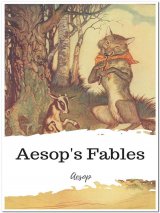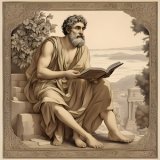Aesop's Fables Page #7
Aesop's Fables, or the Aesopica, is a collection of fables credited to Aesop, a slave and storyteller believed to have lived in ancient Greece between 620 and 564 BCE.
FATHER AND SONS A certain man had several Sons who were always quarrelling with one another, and, try as he might, he could not get them to live together in harmony. So he determined to convince them of their folly by the following means. Bidding them fetch a bundle of sticks, he invited each in turn to break it across his knee. All tried and all failed: and then he undid the bundle, and handed them the sticks one by one, when they had no difficulty at all in breaking them. "There, my boys," said he, "united you will be more than a match for your enemies: but if you quarrel and separate, your weakness will put you at the mercy of those who attack you." Union is strength. THE LAMP A Lamp, well filled with oil, burned with a clear and steady light, and began to swell with pride and boast that it shone more brightly than the sun himself. Just then a puff of wind came and blew it out. Some one struck a match and lit it again, and said, "You just keep alight, and never mind the sun. Why, even the stars never need to be relit as you had to be just now." THE OWL AND THE BIRDS The Owl is a very wise bird; and once, long ago, when the first oak sprouted in the forest, she called all the other Birds together and said to them, "You see this tiny tree? If you take my advice, you will destroy it now when it is small: for when it grows big, the mistletoe will appear upon it, from which birdlime will be prepared for your destruction." Again, when the first flax was sown, she said to them, "Go and eat up that seed, for it is the seed of the flax, out of which men will one day make nets to catch you." Once more, when she saw the first archer, she warned the Birds that he was their deadly enemy, who would wing his arrows with their own feathers and shoot them. But they took no notice of what she said: in fact, they thought she was rather mad, and laughed at her. When, however, everything turned out as she had foretold, they changed their minds and conceived a great respect for her wisdom. Hence, whenever she appears, the Birds attend upon her in the hope of hearing something that may be for their good. She, however, gives them advice no longer, but sits moping and pondering on the folly of her kind. THE ASS IN THE LION'S SKIN An Ass found a Lion's Skin, and dressed himself up in it. Then he went about frightening every one he met, for they all took him to be a lion, men and beasts alike, and took to their heels when they saw him coming. Elated by the success of his trick, he loudly brayed in triumph. The Fox heard him, and recognised him at once for the Ass he was, and said to him, "Oho, my friend, it's you, is it? I, too, should have been afraid if I hadn't heard your voice." THE SHE-GOATS AND THEIR BEARDS Jupiter granted beards to the She-Goats at their own request, much to the disgust of the he-Goats, who considered this to be an unwarrantable invasion of their rights and dignities. So they sent a deputation to him to protest against his action. He, however, advised them not to raise any objections. "What's in a tuft of hair?" said he. "Let them have it if they want it. They can never be a match for you in strength." THE OLD LION A Lion, enfeebled by age and no longer able to procure food for himself by force, determined to do so by cunning. Betaking himself to a cave, he lay down inside and feigned to be sick: and whenever any of the other animals entered to inquire after his health, he sprang upon them and devoured them. Many lost their lives in this way, till one day a Fox called at the cave, and, having a suspicion of the truth, addressed the Lion from outside instead of going in, and asked him how he did. He replied that he was in a very bad way: "But," said he, "why do you stand outside? Pray come in." "I should have done so," answered the Fox, "if I hadn't noticed that all the footprints point towards the cave and none the other way." THE BOY BATHING A Boy was bathing in a river and got out of his depth, and was in great danger of being drowned. A man who was passing along a road heard his cries for help, and went to the riverside and began to scold him for being so careless as to get into deep water, but made no attempt to help him. "Oh, sir," cried the Boy, "please help me first and scold me afterwards." Give assistance, not advice, in a crisis. THE QUACK FROG Once upon a time a Frog came forth from his home in the marshes and proclaimed to all the world that he was a learned physician, skilled in drugs and able to cure all diseases. Among the crowd was a Fox, who called out, "You a doctor! Why, how can you set up to heal others when you cannot even cure your own lame legs and blotched and wrinkled skin?" Physician, heal thyself. THE SWOLLEN FOX A hungry Fox found in a hollow tree a quantity of bread and meat, which some shepherds had placed there against their return. Delighted with his find he slipped in through the narrow aperture and greedily devoured it all. But when he tried to get out again he found himself so swollen after his big meal that he could not squeeze through the hole, and fell to whining and groaning over his misfortune. Another Fox, happening to pass that way, came and asked him what the matter was; and, on learning the state of the case, said, "Well, my friend, I see nothing for it but for you to stay where you are till you shrink to your former size; you'll get out then easily enough." THE MOUSE, THE FROG, AND THE HAWK A Mouse and a Frog struck up a friendship; they were not well mated, for the Mouse lived entirely on land, while the Frog was equally at home on land or in the water. In order that they might never be separated, the Frog tied himself and the Mouse together by the leg with a piece of thread. As long as they kept on dry land all went fairly well; but, coming to the edge of a pool, the Frog jumped in, taking the Mouse with him, and began swimming about and croaking with pleasure. The unhappy Mouse, however, was soon drowned, and floated about on the surface in the wake of the Frog. There he was spied by a Hawk, who pounced down on him and seized him in his talons. The Frog was unable to loose the knot which bound him to the Mouse, and thus was carried off along with him and eaten by the Hawk. THE BOY AND THE NETTLES A Boy was gathering berries from a hedge when his hand was stung by a Nettle. Smarting with the pain, he ran to tell his mother, and said to her between his sobs, "I only touched it ever so lightly, mother." "That's just why you got stung, my son," she said; "if you had grasped it firmly, it wouldn't have hurt you in the least." THE PEASANT AND THE APPLE-TREE A Peasant had an Apple-tree growing in his garden, which bore no fruit, but merely served to provide a shelter from the heat for the sparrows and grasshoppers which sat and chirped in its branches. Disappointed at its barrenness he determined to cut it down, and went and fetched his axe for the purpose. But when the sparrows and the grasshoppers saw what he was about to do, they begged him to spare it, and said to him, "If you destroy the tree we shall have to seek shelter elsewhere, and you will no longer have our merry chirping to enliven your work in the garden." He, however, refused to listen to them, and set to work with a will to cut through the trunk. A few strokes showed that it was hollow inside and contained a swarm of bees and a large store of honey. Delighted with his find he threw down his axe, saying, "The old tree is worth keeping after all."
Translation
Translate and read this book in other languages:
Select another language:
- - Select -
- 简体中文 (Chinese - Simplified)
- 繁體中文 (Chinese - Traditional)
- Español (Spanish)
- Esperanto (Esperanto)
- 日本語 (Japanese)
- Português (Portuguese)
- Deutsch (German)
- العربية (Arabic)
- Français (French)
- Русский (Russian)
- ಕನ್ನಡ (Kannada)
- 한국어 (Korean)
- עברית (Hebrew)
- Gaeilge (Irish)
- Українська (Ukrainian)
- اردو (Urdu)
- Magyar (Hungarian)
- मानक हिन्दी (Hindi)
- Indonesia (Indonesian)
- Italiano (Italian)
- தமிழ் (Tamil)
- Türkçe (Turkish)
- తెలుగు (Telugu)
- ภาษาไทย (Thai)
- Tiếng Việt (Vietnamese)
- Čeština (Czech)
- Polski (Polish)
- Bahasa Indonesia (Indonesian)
- Românește (Romanian)
- Nederlands (Dutch)
- Ελληνικά (Greek)
- Latinum (Latin)
- Svenska (Swedish)
- Dansk (Danish)
- Suomi (Finnish)
- فارسی (Persian)
- ייִדיש (Yiddish)
- հայերեն (Armenian)
- Norsk (Norwegian)
- English (English)
Citation
Use the citation below to add this book to your bibliography:
Style:MLAChicagoAPA
"Aesop's Fables Books." Literature.com. STANDS4 LLC, 2025. Web. 6 Mar. 2025. <https://www.literature.com/book/aesops_fables_316>.








Discuss this Aesop's Fables book with the community:
Report Comment
We're doing our best to make sure our content is useful, accurate and safe.
If by any chance you spot an inappropriate comment while navigating through our website please use this form to let us know, and we'll take care of it shortly.
Attachment
You need to be logged in to favorite.
Log In